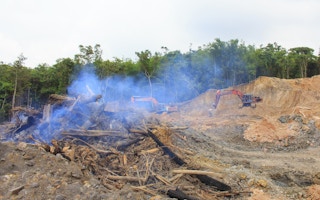The last year has seen an increasing number of producer and consumer companies make commitments to break the link between palm oil and deforestation. Many of these commitments refer to the protection of High Carbon Stock (HCS) areas.
Companies whose new policies mention HCS include Unilever, Wilmar, Cargill and Procter & Gamble, and it is also in the Sustainable Palm Oil Manifesto signed by Sime Darby, IOI, KLK and Musim Mas. The question arises: are we all talking about the same HCS?
The HCS Approach Steering Group was formed in August: a multi-stakeholder body to further refine, oversee and govern the HCS Approach. The HCS Approach builds on the work carried out by Golden Agri Resources, The Forests Trust and Greenpeace in pilot concessions in Kalimantan, Indonesia.
Since August a broader group of stakeholders has become engaged, and an increasing number of companies are field-testing the methodology in different regions. Key challenges include:
- protecting HCS and High Conservation Value (HCV) areas while respecting the right of communities to give or withhold their consent (FPIC) to proposed developments;
- making the HCS approach work in different regions with different vegetation;
- determining which vegetation types are classified as HCS; and
- encouraging an appropriate implementation role for governments.
“
Companies whose new policies mention HCS include Unilever, Wilmar, Cargill and Procter & Gamble, and it is also in the Sustainable Palm Oil Manifesto signed by Sime Darby, IOI, KLK and Musim Mas. The question arises: are we all talking about the same HCS?
As NGOs we support the HCS Approach Steering Group as a multi-stakeholder body with wide representation from industry and civil society. It is accessible to interested parties and seeks to ensure a balance between different interests.
The HCS Approach Steering Group will seek input from experts and scientists, especially from practitioners that are currently field testing the HCS methodology. This gives us the confidence that the HCS tool will be pragmatic yet robust, and will provide a practical transparent framework for responsible plantation development.
While the HCS approach arose from the palm oil industry, this tool is useful for other plantation industries and we are looking forward to cross-commodity approaches.
The HCS Approach is a tool to assist land use planning and is not just a greenhouse gas emissions or carbon assessment. Meanwhile, an HCS Study has been initiated by the Sustainable Palm Oil Manifesto group focused on carbon assessment to determine GHG emissions and socio-economic aspects. We are looking forward to the results of this study, and hope that its findings will further strengthen the HCS Approach.
The HCS Approach is a tool to put in practice commitments to break the link between palm oil and deforestation, and the multi-stakeholder HSC Approach Steering Group will consider any recommendations of the HCS Study that will contribute to this.
The Manifesto group shows that that some of the biggest growers of palm oil acknowledge there is a need for stronger commitments to deal with deforestation and social conflict, which has contributed to the negative image that palm oil currently faces. The announcement that Manifesto companies will temporarily halt the clearance of potential HCS areas is a good first step, but we urge them to announce stronger social and environmental safeguards for all the palm oil they use throughout their supply chains, as well as defining what they mean by ‘potential HCS areas’.
With increasing deforestation rates in palm oil producing countries such as Indonesia, we need to see these companies stepping up to break the link between palm oil and deforestation.
This article was jointly written by Greenpeace, WWF, Forest Peoples Programme and Rainforest Action Network exclusively for Eco-Business.


















